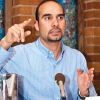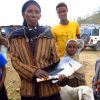D&P still seeks to put the Gospel in action
The April 15 column by Brian Lilley celebrated the decision by the Canadian International Development Agency (CIDA) to reduce the traditional funding of the Canadian Catholic Organization for Development and Peace, funding that helps address hunger, poverty, violence and social injustice around the world. The decision will impact the struggle for development and justice of communities we support, leaving many unfinished projects in Latin America, Africa, Asia and the Middle East.
Holy Week fast for D&P
A week without solid food isn’t going to fill the $5-million hole in the Canadian Catholic Organization for Development and Peace’s budget, but Kaitlyn Duthie-Kannikkatt felt she had to take on a Holy Week fast to protest CIDA cuts to the Catholic movement.
The 22-year-old Carleton University student lived on nothing but tea, water and juice until Easter Sunday even while working on her graduating thesis in the global politics program. By mid-week her protest had raised almost $1,400 for D&P.
“The fact that these cuts took place, or we heard tell of them, during Lent is really telling,” Kannikkatt told The Catholic Register. “Being that time of year, it provided an opportunity for the (D&P) membership across the country to get in touch with this issue in a more spiritual and connected way.”
On Good Friday, Kannikkatt was joined on her fast by almost 300 people who vowed to dedicate their fast to D&P. They will give money they would otherwise have spent on food to the Canadian bishops’ development agency while also writing letters to the government to protest a 65-per-cent cut in CIDA funding for 2011 to 2016.
The member actions have inspired the agency’s 60-plus employees, said D&P program co-ordinator Siobhan Rowan.
“It’s been quite incredible and very heartening,” Rowan said. “And it makes it all the harder to think of what we’re going to lose.”
Kannikkatt has written letters to Prime Minister Stephen Harper and International Co-operation Minister Bev Oda asking for reasons behind the funding cut, but has yet to receive a reply.
“Fasting throughout the centuries has been used as a really powerful means of resistance,” said Kannikkatt.
Citing Indian leader Mohandas Gandhi, Kannikkatt doesn’t believe fasting can be easily classified as either political or spiritual.
“Hundreds of members across the country are going to be joining me in this fast,” she said.
“Fasting together, in solidarity with each other, I think that is an incredible example of the Spirit moving through the people involved in this organization as well as making a powerful statement about the politics behind it.”
Kannikkatt’s final paper is about how a corporate social responsibility program run by a Canadian mining company in Guatemala is affecting development prospects for the local community. After graduation she is travelling with a D&P delegation to the Rio+20 United Nations conference in June.
The idea that the current government is more interested in charity than justice, more interested in corporate image repair than democratic change has the employees of D&P calling for action to confront the Conservatives on their development policy, said Rowan.
There’s no way of knowing precisely how many people working with HIV-positive slum dwellers in Africa or helping poor farmers in Haiti are about to lose their jobs because D&P funding has dried up, said Rowan. In many cases laying off the workers in partner organizations will dismantle years of patient, slow work and throw skilled people on the street in countries with no social safety net, she said.
In Ottawa, Kannikkatt isn’t complaining about hunger pangs. She’s thinking about the future of the movement.
“It means we’re going to have to start seeing how we can work differently with our allied organizations in the ecumenical world and in the secular world — see how we can combine our efforts a little bit more,” she said.
“Also we have to see how we can speak out with a more collective voice against this trend in the government away from good, solid, trusted development work that organizations like Development and Peace do to something much more problematic.”
D&P’s funding woes a perfect chance to get back to its roots
The Canadian Conference of Catholic Bishops (CCCB) recently issued a statement saying they are “extremely disappointed” with the news that the Canadian Catholic Organization for Development and Peace had its latest government funding come in much lower than expected.
I for one couldn’t be happier.
Well, actually, I would be happier if D&P lost all of its government funding, but dropping from a request of $49 million over five years to just $14 million over five years is a step in the right direction.
Bishops rally in support of D&P
Bishops and lay people have come out swinging in defence of the Canadian Catholic Organization for Development and Peace in the face of a massive funding cut from the federal government.
Development and Peace suffered a 65-per-cent cut in CIDA funding in March. Between 2011 and 2016 the government will supply $14.5 million to fund specific Development and Peace programs in seven countries. Over the previous five years CIDA had given $44.6 million. Development and Peace supports 186 local organizations in 33 countries.
The bishops of Saskatchewan have sent out a letter to all Catholics in the province warning that “these funding cuts will have a drastic effect.”
D&P funds raised via postage stamps
MONTREAL - Francois Gloutnay is stamping out poverty — one stamp at a time.
Gloutnay, communications officer at the Montreal office of the Canadian Catholic Organization for Development and Peace, the official international development organization of the Catholic Church in Canada, is an avid stamp collector. He also sells them. Every year he helps organize stamp sales at Montreal-area shows to raise money for D&P.
The stamps sell for a few cents each, but it all adds up. Since 1992, when Gloutnay became involved in the fundraising effort, he has helped raise over $335,000 for D&P programs around the world.
Searching for answers about D&P funding cuts
Canada’s bishops are asking the government to explain a 68 per cent cut in CIDA funding to Development and Peace, but development experts and opposition politicians are offering explanations the bishops are unlikely to hear from the government.
University of Toronto development expert Wilson Pritchart says domestic politics is lurking behind CIDA funding decisions.
“What the government in fact is doing is cutting funding to organizations that are critical of it, that are critical of the aid agenda,” Pritchart told The Catholic Register. “And to some extent cutting funding to NGOs that are at all political in favour of using NGOs as conduits for service delivery.”
Is D&P worth donating to? You decide
The question arises because last June I wrote in this column that CCODP “has a tenuous claim on Catholic dollars because, aside from fundraising in Catholic parishes, they have a tenuous relationship with any distinctively Catholic mission. In their operations they are largely — and by their own proud design — indistinguishable from any number of peace and justice NGOs working in the developing world.”
The bishops of Canada take a different view and, in a March 22 statement, urged Catholics to redouble their generosity during the annual Share Lent campaign. In Kingston, our own archbishop sent a message to all parishes to that effect. I included it in my parish bulletin in the space usually reserved for my own message.
Take a stand on D&P
In a perfect world, agencies dedicated to lifting people out of poverty would be well financed with both private and public funds. But the world of 2012 is far from perfect so it should be no shock that Development and Peace is reeling from a 68 per cent cut in government funding.
Governments everywhere are scrambling to reduce huge budget deficits and ballooning debts exacerbated by global economic turmoil. In Canada, amid expensive national infrastructure and bailout programs, the Conservative government changed its approach to foreign aid in 2010. Where foreign aid used to be based on a percentage of GDP, it is now capped at $5 billion annually.
D&P is a sign of faith in Canada and globally
They were exciting times. Pope John XXIII, just months after being elected as Pope, called for an Ecumenical Council. The sorrows, suffering, hopes and joys of the human family were to be those of the Church as well. Bishops, theologians and others from all over the world gathered in Rome from 1962-65 to debate the issues of the day and their relationship to the faith and sacramental life of the Church. One could almost say that the Church saw herself now as part of a global village.
Pope John XXIII also asked the Church of the global north to be concerned about the struggles of the global south. Many religious orders and dioceses responded. These were inspirational times and brought the issues of the human family world wide into the consciousness of Catholics here in Canada
D&P reeling after government imposes 65 per cent funding cut
Development and Peace is facing significant program reductions and staff cuts after the 45-year-old Catholic lay movement was hit by a 65 per cent cut in government funding.
“It’s going to be a very difficult period for the organization,” said D&P executive director Michael Casey. “It’s not just staff here or the institution here in Canada. You look at the impact it’s going to have on the partners.”
New LifeSite accusations target D&P Haitian partner APROSIFA
Canadian bishops are once again facing embarrassing questions about an overseas organization that received funding from the Canadian Catholic Organization for Development and Peace (D&P).
This time, the issue involves a Haitian organization, APROSIFA, that allegedly dispenses free contraceptives and promotes access to abortion, according to an online report.
The common good is the choice we must make
In a time of high unemployment, jittery stock markets and worrying news about the European and American fiscal crises, many Canadians have been lowering their debt loads.
Their federal government is planning to do the same. Its challenge is to implement cuts without stalling a fragile recovery while also making the investments necessary to protect the next generation of Canadians.
Betting on Haiti’s next generation
There are several revolutions going on in post-earthquake Haiti and one of them is changing how Canada’s Catholic development agency thinks about its work.
Prior to the January 2010 earthquake, the Canadian Catholic Organization for Development and Peace’s core development work had always been long-term. Agreements with partner agencies usually spanning four or five years, with some partner relationships that have extended over 20 years.
Now the problems in Haiti have Development and Peace thinking in terms of generations.
D&P's Share Lent appeal launches
OTTAWA - Archbishop Richard Smith is inviting Catholics to open their hearts to those in need by contributing generously to this year’s Share Lent campaign.
The annual fundraising campaign kicks off Feb. 22 and runs through April 7. It is the major fundraiser for the Canadian Catholic Organization for Development and Peace, the Canadian bishops’ development agency, accounting for about 30 per cent of its annual budget.
D&P aims for $10 million with annual Share Lent campaign
OTTAWA - The Canadian Catholic Organization for Development and Peace launched its annual Share Lent fundraising campaign here March 16 with the goal of raising $10 million.
Under the banner Building a World of Justice, the Canadian bishops' overseas development agency aims to collect $10 million across Canada to go towards more than 200 sustainable development projects it supports in Africa, Asia, Latin America and the Middle East.
The theme for this year’s campaign expresses the collective work of the many local organizations that D&P has supported over the last 40 years.















